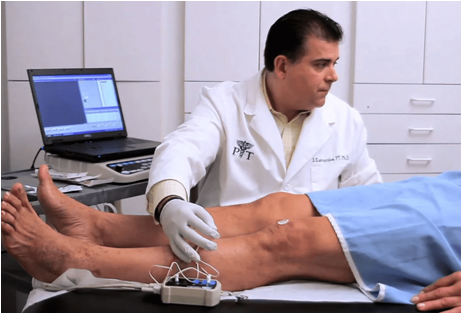Nerve Testing (EMG/NCS)
NCS stands for Nerve Conduction Studies and EMG stands for Electromyography.
The NCS/EMG test has two parts:
1. Nerve Conduction Studies (NCS)
Nerve Conduction Studies are used to measure the health of your nerves. Mild electrical stimulation is administered to the skin directly overlaying the nerve. The response is measured by a second set of electrodes applied to the surface of the skin. This impulse produces a visual signal on a computer monitor and when analyzed it can provide information about the condition of the nerve.
2. An Electromyogram (EMG)
Electromyogram (EMG) measures the electrical activity of muscles at rest and during contraction. Nerves control the muscles in the body by electrical signals (impulses), and these impulses cause the muscles to react in specific ways. Nerve and muscle disorders cause the muscles to react in abnormal ways. During an Electromyography study, a very small pin is inserted in the muscle that helps us evaluate the condition of your muscles.
Measuring the electrical activity in muscles and nerves can help find diseases that damage muscle tissue (such as myopathy and muscular dystrophy) or nerves (such as amyotrophic lateral sclerosis or peripheral neuropathies). EMG test and Nerve Conduction Studies are often done together to provide us with more complete data.
The results of NCS/EMG testing can be an invaluable tool for your doctor to determine various conditions that can affect your nerves and muscles, which will help them manage your care more effectively.NCS/EMG test is easy, reliable and safe!
How to Prepare for your NCS/EMG Test ?
- Do not use any body or hand lotion the day of the test.
- Let us know if you have a pacemaker or a defibrillator.
- Make sure that you know the kinds of medications you are taking.
- Let us know if you are taking aspirin
